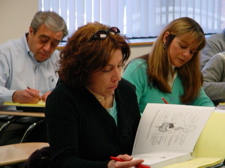BU’s interpreter certificate program: opening doors to a booming field
Chinese, Portuguese, Spanish offered in medical, legal, and community fields

There is a growing demand for interpreters with knowledge in specialist areas such as legal and health interpreting, according to the U.S. Bureau of Labor Statistics. Indeed, the bureau projects that employment of interpreters and translators will to increase by more than 30 percent between now and 2112.
The reason for the rosy job outlook in the field is an increase in foreign language speakers in the United States, according to Michael O’Laughlin, director of BU’s legal, medical, and community interpreter certificate program. “The workplace is becoming more globalized, and professional interpreters are needed in places such as courts, hospitals, and service agencies.”
The program, administered by the University’s Center for Professional Education [http://butrain.bu.edu/cpe/] at 1010 Commonwealth Ave., began training interpreters in Spanish and Portuguese three years ago and added Mandarin Chinese last January. Students and instructors meet on Saturday mornings for about a year for a minimum of 144 hours of classes taught by such veteran interpreters as Izabel Arocha, cultural and linguistic educator at the Cambridge Health Alliance, and Jaime Fatas Cabeza, a staff judiciary interpreter and translator for the Trial Court of Masachusetts.
Graduates of the community interpreting section go on to work in education, social services, industry, public relations, and local government issues and affairs. In the legal interpreting section, instructors present students with a wide range of legal scenarios — including criminal court sessions, depositions, financial affairs, and hearings before immigration authorities — along with the fundamentals of legal processes and legal terminology. Medical interpreting students are prepared for the field through case studies, role-playing, and a review of medical procedures.
Medical interpretation is the fastest-growing specialization in multilingual professionalism. “It’s a booming field, especially in Massachusetts after a law was passed in 2001 that requires hospitals to provide interpreters for emergency room services,” says O’Laughlin. Indeed, in a hospital emergency room, clear and fast communication can make the difference between life and death. Because language barriers can lead to major medical errors, an interpreter’s role is critical. “The doctor, the patient, and the interpreter are in a triadic relationship,” he says. “All three make up a team with the goal to make the patient better.”
Medical interpreting student Maria Michelin, a professional Portuguese interpreter at the East Somerville Health Center, says that the role-playing in her courses “present very realistic scenarios. I can say that from experience.” Michelin, originally from Brazil, has been an interpreter for seven years and enrolled in the program to polish her technique. “Now I can translate more quickly and accurately,” she says. “I definitely notice the difference.” She points out that Somerville has a large Portuguese and Brazilian population. “About 80 percent of our patients are Brazilian,” she says.
Applicants for the medical, legal, and community interpreting program must first pass an audio screening and then a written and oral interpretation exam. Once students graduate from the program, they can sign up for a 100-hour internship at a local hospital, law firm, or community organization in order to improve their skills and help establish a network of contacts in the field.
The program runs classes for Portuguese and Spanish speakers twice a year, with classes starting in September and January. Classes for Mandarin Chinese speakers run annually, beginning in January. An information session on the program will be held on October 12 from 6 p.m. to 8 p.m. at the School of Management, Room 322. For more information, call 1-800-288-7246 or click here.